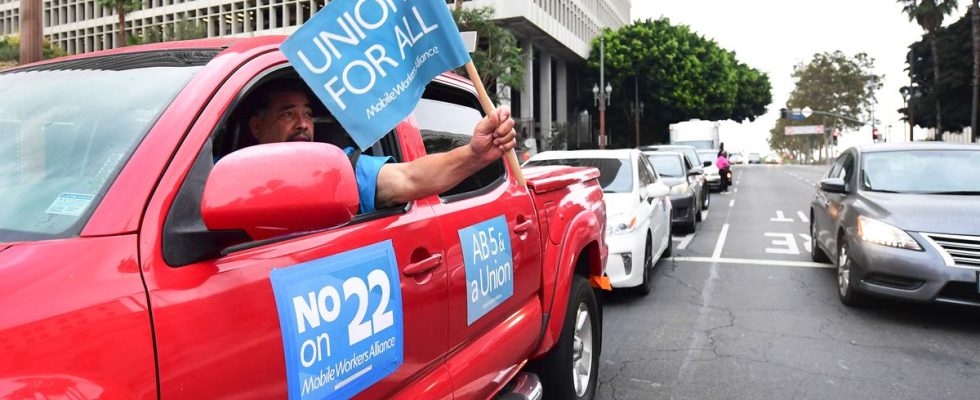This is a victory for the international company whose economic model depends on this status. The law on the independent status of drivers of applications like Uber is not contrary to the Constitution of California, ruled on Monday a court of appeals of this American state. “Today’s decision is a victory for workers and the millions of Californians who voted for Proposition 22,” said Tony West, Uber’s chief legal officer, referring to the law passed in a referendum in 2020, which devoted paid work to the task but granted drivers some social benefits.
In the United States and most countries, Uber, its American competitor Lyft and other platforms refuse to consider drivers as full employees, which would mean granting them certain rights, such as unemployment benefits or unemployment benefits. possible collective bargaining. The SEIU, a union that campaigns for the status of employees, won a first battle in August 2021, when a judge declared Proposition 22 “unconstitutional”, because it limited “the power of the assembly” to legislate to the future on this subject.
A “terrible blow”
But Monday’s decision is a “terrible blow” according to Nicole Moore, president of Rideshare Drivers United (RDU), a California drivers’ association. “We are all flabbergasted, angry and ready to continue the fight,” she said. “Last year we showed how bad Proposition 22 is for drivers,” she added.
According to reports from the RDU, less than 10% of drivers benefit from the health insurance promised by this law, and they earn an average of “6.20 dollars per hour” after their expenses, “which is lower than the salary federal minimum,” she explains. The association hopes that the SEIU will appeal and take the case to the California Supreme Court. Uber epitomizes the “gig economy”, or the gig economy, widely adopted, but also widely criticized, in many major cities around the world.
Service Disruption Threats
The group defends its economic model step by step. He nevertheless had to let go of ballast in certain countries, starting with the United Kingdom, where he had to grant in 2021 a status of salaried worker to his British drivers, with minimum wage and paid holidays, a world first for the company. . In the United States, the platform continues to resist the various attacks.
With its competitor Lyft and delivery services, it had spent in 2020 more than 200 million dollars to promote the “yes” to Proposition 22. And three months before the vote, the two Californian companies had threatened to completely interrupt their service in the state, which would have put tens of thousands of people out of work. Voters had voted 58.6% in favor of the law proposed by the companies.

